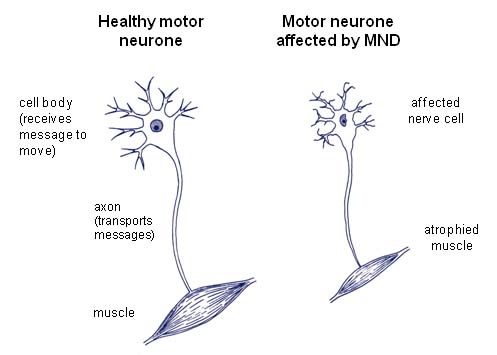0.06: Symptoms and symptom Management
Introducing some of the symptoms of MND, when and how they may occur, and what you can do to help manage them.
MND may have no cure but symptom management (helping people to live as well as they can) is possible.
Symptom management is essential and the important role you play in it is what this course is about.
hat is happening when someone has MND?
MND affects the nervous system, the part that uses motor neurones. Motor neurones control how muscles move. The diagram below shows the main parts of a motor neurone.

Each motor neurone connects the brain with a particular collection of muscle fibres elsewhere in the body. The cell body exists in the brain, brain stem or spinal column, and the axons allow electrical signals to be transmitted between the cell body and muscle fibres, prompting them to contract and relax. Groups of motor neurones will work together to operate muscles in organs, glands, and elsewhere around the body.
In MND motor neurones deteriorate and reduce the messages they send to the muscles. As a result muscles weaken, waste and stiffen. This affects movement, breathing, swallowing and speech.
There may also be a change in the way that the person living with MND thinks. This is sometimes referred to as cognitive change.
What symptoms might you see?
The progress of MND is unpredictable – it may begin in different ways e.g. with voice change, or weakness in the legs or arms and it may advance quickly or slowly. It is however always progressive, and movement and muscle once lost will not be regained.
Because MND affects people in different ways not everyone will experience all of the following symptoms, or in any particular order. They may even have symptoms that are not mentioned here. The symptoms commonly experienced by people living with MND are listed here, organised by activity:
Moving
- Muscle wasting and weakness
- Twitching (Fasciculation)
- Cramps
- Stiffness (Spasticity)
- Pain
- Tiredness
Breathing
- Difficulty breathing
Communicating
- Problems with speech
Swallowing and Eating
- Swallowing problems
- Saliva and mucus problems
- Weight loss
Thinking, reasoning and behaviour
- involuntary crying or uncontrollable episodes of crying and/or laughing, or other emotional displays (Emotional lability or pseudo-bulbar effect)
- Affected mental abilities (Cognitive change)
The following are rarely affected in MND:
- Senses: touch, taste, sight, smell and hearing
- Bowel and bladder function
- Sexual function
- Eye muscles
- Heart muscles
